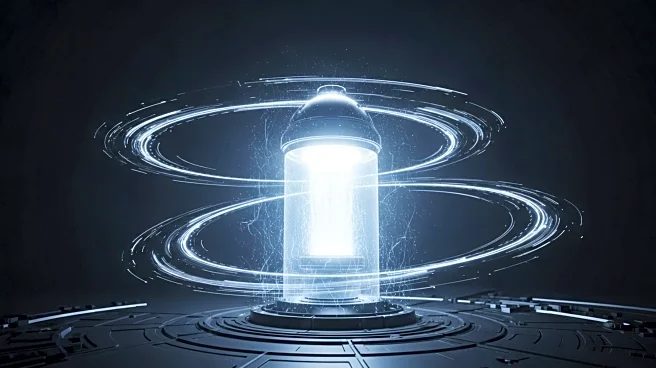What's Happening?
Commonwealth Fusion Systems (CFS) has entered into a significant agreement with Italian energy company Eni, selling over $1 billion worth of power from its upcoming fusion reactor, Arc. The reactor, which will be located near Richmond, Virginia, is expected to be operational by the early 2030s. This deal follows a previous agreement with Google, which plans to purchase half of the reactor's output. The Arc reactor is designed using the tokamak system, which utilizes superconducting magnets to confine and compress plasma, facilitating nuclear fusion. CFS is recognized as a leader in the fusion industry, and its demonstration-scale Sparc reactor in Massachusetts is 65% complete, with plans to activate it in 2026. The agreements with Eni and Google are structured to accommodate potential delays or challenges, reflecting the complexities of pioneering fusion technology.
Why It's Important?
The deal between CFS and Eni marks a pivotal moment in the advancement of fusion energy, a field that promises to revolutionize power generation with cleaner and more sustainable options. Fusion energy has the potential to significantly reduce reliance on fossil fuels, impacting global energy markets and contributing to environmental goals. The involvement of major companies like Google underscores the growing interest and investment in fusion technology, which could lead to substantial economic and technological shifts. However, the high cost of fusion-generated electricity and the technical challenges involved highlight the risks and uncertainties in commercializing this technology. Successful implementation could position the U.S. as a leader in fusion energy, influencing energy policy and industry standards worldwide.
What's Next?
As CFS progresses with the construction of the Arc reactor, the company will continue to seek financial investments to support the project. The agreements with Eni and Google provide a framework for establishing fusion power pricing, which is crucial for attracting further investment. The completion and activation of the Sparc reactor will be a critical milestone, offering insights into the feasibility and efficiency of fusion energy production. Stakeholders, including investors and energy companies, will closely monitor these developments, as successful fusion energy could reshape the energy landscape. The collaboration between CFS and its partners may also lead to further technological innovations and partnerships in the fusion sector.
Beyond the Headlines
The pursuit of fusion energy raises ethical and environmental considerations, particularly regarding the long-term impact on energy markets and global carbon emissions. The development of fusion technology involves significant financial and scientific resources, prompting discussions about equitable access and the distribution of benefits. Additionally, the potential for fusion energy to disrupt traditional energy industries may lead to economic and political shifts, necessitating adaptive strategies from stakeholders. As fusion technology advances, it will be essential to address regulatory and safety concerns to ensure responsible and sustainable implementation.










